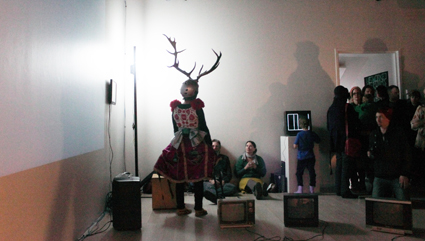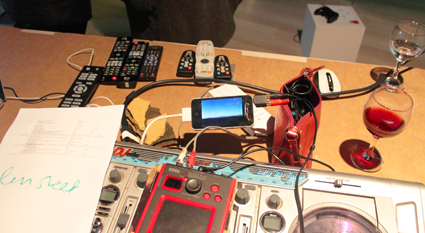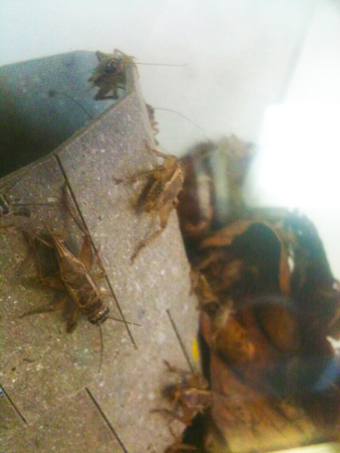Cracking the technology case
Judith Abell, Notorious R + D, Networked Art Forms and Tactical Magick Faerie Circuits, CAST, DARK MOFO

Selena de Carvalho, (un)popular culture
photo Nancy Mauro-Flude
Selena de Carvalho, (un)popular culture
There is a low hum of voice and technology as the artist kneels within a circle of television monitors. She wears a collage of ritualistic gear, a little Hungarian folk, a little found material. On her head an adapted bike helmet, sprouting antlers, balances precariously. With smartphone amplified, she follows the instructions given by a male American voice. He guides a séance for the participants—this circle of obsolete devices.
Asked to hold hands (read cords) of those gathered, artist Selena de Carvalho becomes the conduit between the living and the dead as she attempts to make contact with a lost analogue television signal. I half expect to see a monitor flicker into life. There is so much electronic gear in this gallery space, surely something could flash us a message from the technological afterlife. It doesn’t.
De Carvalho’s (un)popular culture is part of Notorious R + D, an exhibited outcome of Networked Art Forms and Tactical Magick Faerie Circuits (NAF:TMFC), a festival developed by curator Nancy Mauro-Flude and producer Pip Stafford with CAST as part of the DARK MOFO festival. The provocatively long title covers a range of happenings including performances, symposia, radio broadcasts, networking events, exhibitions and workshops and the intentions behind NAF:TMFC are equally multifarious. Stafford describes it as an opportunity to connect a network of people working with similar materials, a chance to share skills among participants and a means to crack open the ‘case’ of technologies that we are often too scared to tinker with. Empowerment is a key expression and in this context hacking is far from a dirty word, instead a means to this end. Within what Mauro-Flude describes as a hothouse environment, eight local artists have made works in response to their NAF:TMFC experience.

Networked Art Forms and Tactical Magick Faerie Circuits (NAF:TMFC) Presentation Desk. featuring Rahni Allen’s video stream from HELIUM BALLOON LAUNCH # 5 Smartphone Satellite Love Letter to the Universe TEST #1 ( SSLLUT #1 )
photo Nancy Mauro-Flude
Networked Art Forms and Tactical Magick Faerie Circuits (NAF:TMFC) Presentation Desk. featuring Rahni Allen’s video stream from HELIUM BALLOON LAUNCH # 5 Smartphone Satellite Love Letter to the Universe TEST #1 ( SSLLUT #1 )
The evening begins with Rahni Allan’s HELIUM BALLOON LAUNCH # 5, Smartphone Satellite Love Letter to the Universe TEST #1 (SSLLUT #1 – see video of launch by Emma Bugg). In an artist’s statement, she describes herself as being on a mission to communicate her love to the universe. The packed gallery empties into the courtyard to watch Allan, in astronaut-style overalls, release SSLUT #1—an android device strapped to a bunch of orange helium balloons. Launch successful, the crowd pours back in to watch a projected video call to the device. Amusingly, the image we receive is on its side (the gyro function perhaps), so we all tilt our heads accordingly. It is hard not to personify this small climbing phone as it sends back poor quality video like a tiny data-naut. We watch it until it stops—“we ran out of credit,” proclaims Stafford—and the crowd shifts focus. I wonder where SSLUT#1 went, with last frames showing it high above the city, looking down on the winding river at dusk.

Astrid Joyce, Holla, detail still
photo Nick Smithies
Astrid Joyce, Holla, detail still
In Holla, Astrid Joyce eschews any plugged-in technology. The work is constructed of several clear perspex ‘speaker boxes’ fixed to the wall, containing tiny colonies of crickets nesting within leaf matter. In the dark of the gallery they come to life; we can listen in to their chatter through ‘amplifiers’ on the tops of the boxes. Joyce’s statement suggests that the work draws on an underpinning concept of technology—communication. The delicate, incessant squeaking of the crickets makes me think that this could be the sound of Twitter, as tiny missives roll endlessly into the Twittersphere. (See also Jon Drummond’s Twitter driven sound installation, part of Echosonics, UTS Gallery on realtime tv.)
Jeweller Emma Bugg has constructed a romantic response to NAF:TMFC. Using Instagram, Facebook and a blog site, she has crowd-sourced imagery of accidental hearts—in the footpath, in a fence, in the lichen on a rock. She has crafted a silver-smithed QR code to be worn on the body as a brooch. When the pin is scanned it connects directly to the gallery of found hearts. When I speak to her at the event, Bugg tells me that the call out has produced a kind of positive virus, where her ‘crowd’ is seeing hearts everywhere. If they are seeing hearts, Bugg thinks they’ll be thinking love, so her pin could be an index to a collective mind shift.
Perhaps it is appropriate that I review NAF:TMFC because it sits just outside my comfort zone. I embrace a range of technologies in my daily life, but there is a point at which my mind turns to white noise and the alternate language of artists like these flows over and around me without sticking. Initially I really felt that the aspiration for accessibility and empowerment wasn’t available to me and I would still argue that many will be locked out by the cult-like feel of the event. But with persistence, understanding came. The works, like those described above, where the heart, the ritual, the idea of frailty, are returned to technology, seem to capture the spirit of the endeavour. They hold something I can grasp or identify with. And with time, exploring the exhibition in a near empty gallery, I see that the collected works cultivate potential for play and discovery—qualities that chip away at the white noise and allow for a singular experience.
CAST, Networked Art Forms and Tactical Magick Faerie Circuits, curator Nancy Mauro-Flude, producer Pip Stafford, CAST facilitator/producer Kylie Johnson; http://tacticalmagick.net/; http://www.darkmofo.net.au/program/notorious-rplusd/
RealTime issue #115 June-July 2013 pg. web






